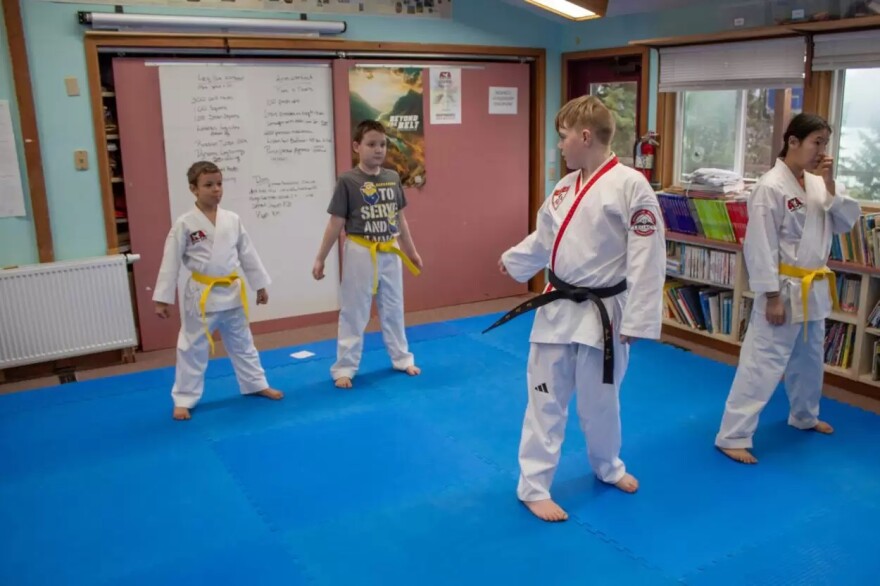School just let out for the day, and students in the tiny Southeast Alaska community of Whale Pass quickly hustled to change into their taekwondo uniforms.
They then gathered on a blue mat in one of the school’s two classrooms and turned their attention to a big-screen TV. Through a projected Zoom meeting, Senior Master Dometrius Hill began to lead the taekwondo class — from Texas.
Within minutes, the internet connection started to break up, and Hill’s voice became garbled. But 12-year-old black belt Jesse Dempsey understood him just fine.
“Sir!” Jesse answered. “Front row, step back with the right foot, left low block,” he said, directing his classmates.
At one point, the connection cut out entirely, and Jesse was left to lead the class, with help from his mom, Michelle Dempsey.
“We apologize for the technical difficulties, but this is a day in the life of Whale Pass Taekwondo,” Michelle said.
Tucked into the northeast side of Prince of Wales Island, Whale Pass is among the most remote towns in Alaska. It’s home to fewer than 100 year-round residents, and the nearest grocery store is an hour and a half drive away. Jesse is one of only seven students who currently attend its school. That low count is an existential threat to the school — the state will cut off funding if they don’t get more students soon.
All but one of the school’s students participate in taekwondo. Their low blocks and high kicks could be the school’s salvation. Starting next year it will become a magnet school, attracting temporary students from the Lower 48, using taekwondo as a selling point.
That only works because Whale Pass has the unlikely distinction of being the nation’s first and only school offering Songahm Taekwondo as a school sport. And as the first ATA Martial Arts certified taekwondo dojo in Alaska, the students have literally put Alaska on the taekwondo world’s map.

At the end of class, Jesse demonstrated one of the eight events he competes in, called extreme forms.
“Judges, my name is Jesse Dempsey. I’m from Whale Pass, Alaska. With your permission, I will begin,” Jesse recited.
From the mat, he proceeded to perform a series of carefully choreographed punches, kicks and cartwheels to music. Similar to a gymnastics floor exercise, judges score him on the overall performance as well as the technique and placement of his hands and feet. And so far, the judges have been impressed.
Master Hill said when the students competed in the Northwest Regional Championships around this time last year, Washington, Oregon, Idaho and western Canada were on the division maps. The kids noticed that Alaska however, was not.
“And they’re like, ‘Why isn’t Alaska on the map? We won, and our state isn’t even on the map,’” Hill said.
This year, Alaska is on the map.
“And just to see the pride and the smile on their faces, ‘Hey, we’re on the map! We’re on the map!’” Hill recalled. “I said, ‘OK, now you got to go show them that you deserve to stay on the map.’”
The Whale Pass kids have taken that to heart. Four of the students, including Jesse, are getting ready to compete in the regional championships on June 7. If Jesse wins there, he’ll qualify for the world championships, which is only open to black belts.
Hill said other schools’ instructors are often shocked at how good the students are, wondering how frequently he travels to Alaska. But he’s only been to Whale Pass once, for a few days last fall. A handful of other guest instructors have visited too, but otherwise, the students have learned entirely by video conference — and from Jesse Dempsey.

It all started when the Dempseys moved to town a couple years ago. Jesse had been training with Hill in Texas, and he didn’t want to give that up. His mom, Michelle, said Hill was like a surrogate father.
“That’s his male figure in his life, that’s who he looks up to. So I wanted to keep that dynamic going for him,” Michelle said. “And Senior Master said that he would continue to train him via Zoom, just like we did during COVID.”
Jesse’s peers quickly noticed the new activity.
“He was practicing on the playground at recess, and some of the other kids saw it and they were like, ‘Well, we want to do that too,’” Michelle said.
Hill invited the other kids to join in on the lessons, and they soon formed the first certified Songahm Taekwondo studio in Alaska. Two and a half years in, Jesse said he enjoys living in Whale Pass.

“It’s very beautiful. There’s really nice people and nice, fresh air,” Jesse said. “You can see the night sky very well compared to down south.”
He speaks in pretty mature themes for a 12-year-old.
“The only problem with living up here is probably the cost and the isolation,” he said.
And if you ask his mom, that’s all a product of taekwondo.
“It gave him a sense of discipline, self-confidence. He can now go up and talk to people, when before he would just hide,” she said. “It’s turned him into a very respectful young man who gets compliments on his politeness everywhere he goes.”
Michelle said it’s been surreal to see taekwondo catch on in Whale Pass, and neighboring Naukati Bay, which now has four students who also participate.
“It’s really cool to see kids from these little, tiny communities that nobody has heard of go down to the Lower 48 and forgive me for saying it, kick butt and take names,” Michelle said. “And they’re like, ‘Where are you from?’”

